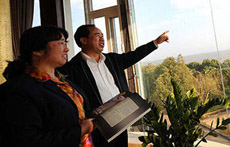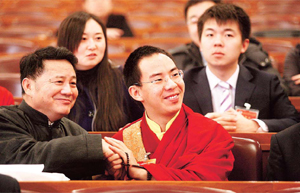Voice from Hong Kong
Updated: 2010-03-03 14:37
South China Morning Post: Wen vows bigger pie, fairer split, as wealth gap grows 06/03
Premier Wen Jiabao has pledged to boost social spending and redistribute wealth this year, as a widening wealth gap threatens the country's stability.
To achieve that, China will raise basic salaries, tighten regulations on salaries in monopolised industries and clamp down on grey income.
The pledge comes amid louder calls for social equality, as the relatively few urban rich are acquiring even more wealth while the many millions of rural poor have yet to benefit from the country's economic boom.
South China Morning Post: Delegates take tentative step to using new media with microblogs 04/03
Following their top leaders, including President Hu Jintao and Premier Wen Jiabao , mainland officials and delegates are turning to the internet to reach out to the public and make their voices heard. Blogs, webcasting and online interviews are becoming increasingly popular as, by the end of last year, the mainland had 380 million internet users, more than any other country.
About 10 of more than 2,000 CPPCC representatives and four of nearly 3,000 NPC delegates are posting on two of the mainland's biggest microblog platforms, most of them registered just a few days ahead of this year's sessions.
According to a People's Daily survey early this week, more than 90 per cent of the 97 NPC delegates who responded said they considered new media "important for them to gather information" from the people.
Analysts said it would also be interesting to see how the new online tools - such as microblogs and other social networking systems, would change China.
South China Morning Post: Dismantling the hukou system requires care 03/03
The system, known as hukou, is an anomaly amid China's economic and social rise. With 200 million people no longer living in the place where they are registered, the system has clearly outlived its usefulness.
Authorities are well aware of the problems. The majority of migrant workers and their families in cities are not entitled to social services such as health care, public housing assistance and, most worrying, education. Premier Wen Jiabao in December promised continued steady reform of the system to ensure that all people had the same rights. A policy document issued last month by the Communist Party's central committee and the State Council envisaged changes that would affect only a minority of migrants.
Reform is a complicated matter. Dismantling the system clearly has to be a carefully thought out, step-by-step process. Pilot schemes have been undertaken in Guangdong and Zhejiang provinces and in Shanghai, Chengdu and Wuhan, but they have affected only a small number of migrants. The scale of the challenge means that lawmakers have to give it priority at their meeting in Beijing. Every effort has to be made to ensure that all Chinese are given equal opportunities - for their own good and for the good of the country.


